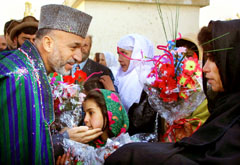Afghanistan: Prospects for Peace and Reconstruction
 Image on right: Afghan Interim Prime Minister Hamid Karzai, left, greets an Afghan orphan girl, during a goodwill visit to the Alawuddin Orphanage in Kabul. (AP Photo/Brennan Linsley)
Image on right: Afghan Interim Prime Minister Hamid Karzai, left, greets an Afghan orphan girl, during a goodwill visit to the Alawuddin Orphanage in Kabul. (AP Photo/Brennan Linsley)
As Afghanistan works to rebuild its society in the aftermath of successive wars, experts gathered at the Institute to aid that process by focusing on:
- Prospects for lasting peace, given the country's recent history of warfare and tribalism.
- Difficulties confronting Afghans and the international community as they strive to put a permanent government in place.
- Challenges to be faced in rebuilding Afghanistan's economy and infrastructure.
- Security issues facing international aid and reconstruction workers in-country.
This discussion was webcast-live and included questions from the floor and the Internet audience.
Panel
- Ambassador James Dobbins
Special Envoy for Afghanistan, U.S. Department of State
A veteran diplomat charged with peacekeeping operations oversight in Haiti and Somalia, Dobbins served as Special Advisor to the President and Secretary of State for Kosovo Implementation, and has been the senior U.S. diplomat responsible for Afghanistan. - Barnett R. Rubin
Center for International Cooperation, New York University
A former Senior Fellow at the U.S. Institute of Peace and frequent consultant to Amnesty International and Human Rights Watch, Rubin has published extensively on Afghanistan and Central Asia, with particular emphasis on revolt, state building and economic development there.
Moderator
Deepa Ollapally
Program Officer and South Asia Analyst, U.S. Institute of Peace
Archived Audio
Event Proceedings
Running Time - 1 hr 22 min • 16M Download



